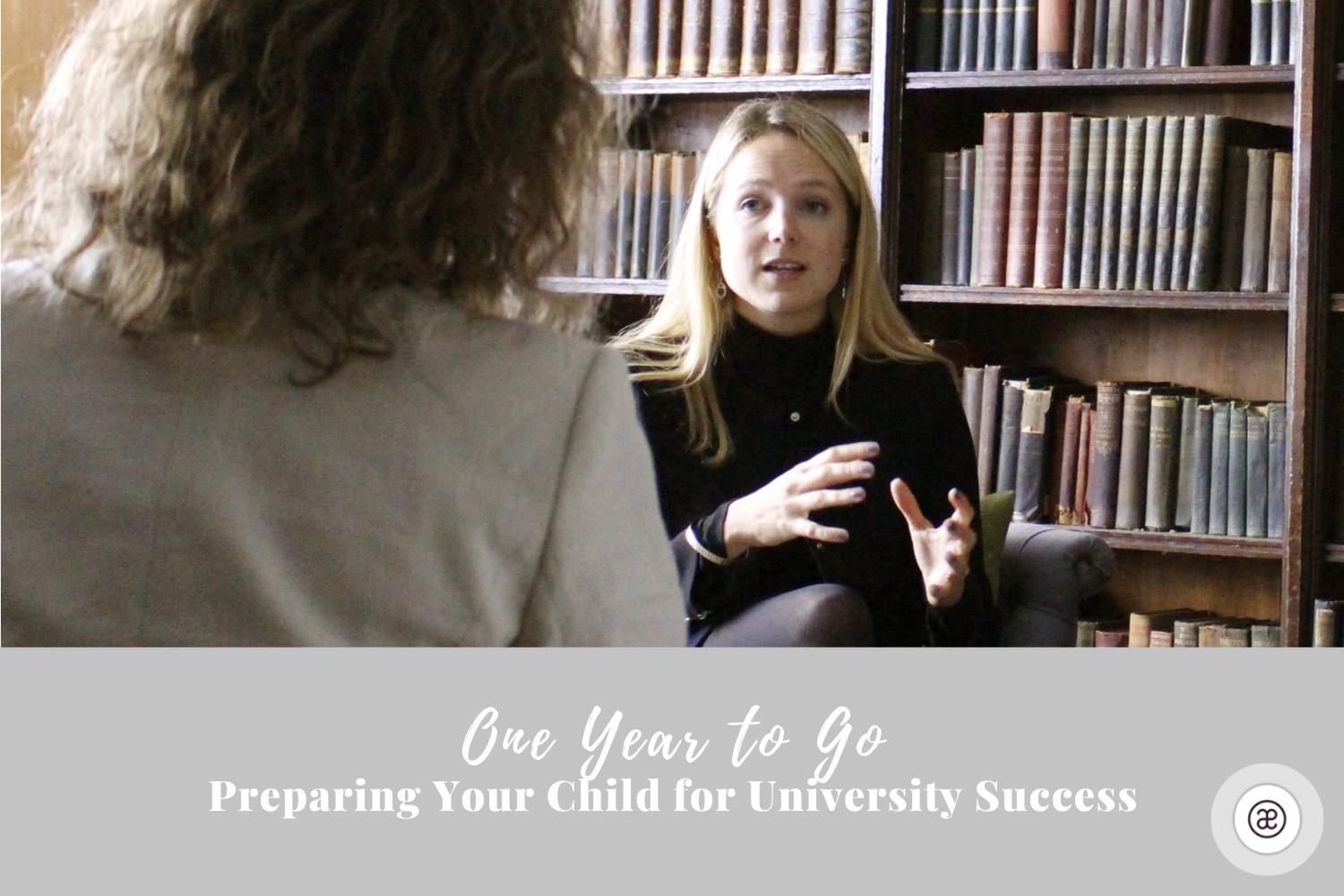
One Year to Go: Preparing Your Child for University Success
For students in their final year of school, the lead-up to university is both exciting and demanding. It is a time of critical decisions, academic milestones and important deadlines. For parents, this year offers a unique opportunity to support, guide and empower their children to make the best possible start to their higher education journey.
With university applications becoming more complex and competitive, the most successful applicants are not simply the highest achievers. They are the ones who begin early, prepare thoughtfully and approach the process with clarity and strategy. Whether your child is applying to universities in the UK, the US or both, this guide outlines how to navigate the coming year in a way that reduces stress and increases confidence.
< text-decoration: none; a href="https://www.almostessential.com/shop/category/our-services/education-and-culture/" target="_blank" rel="noopener noreferrer">
Early-Year Planning
Spring to Summer Term
The first part of the year sets the tone for everything that follows. This is the time to gain direction, identify key targets and make informed decisions.
Clarify Career Goals and Interests
Before diving into course choices, it is important to reflect on what your child enjoys, what they are good at and where those two areas overlap. A meaningful discussion about long-term aspirations can help narrow their focus.
Encourage your child to:
Speak with their school’s career adviser or university counsellor
Review their subject selections to ensure they align with future goals
Attend introductory lectures, online tasters or career events
This is not about locking in a future career at 17, but about taking the first serious steps towards one.
Explore Aptitude and Fit Before Committing
A significant proportion of students change direction after starting university. Some studies estimate that up to 80 percent of students change their major at least once during their studies, and between 20 to 82 percent do so in the first year alone. While flexibility is part of the university experience, choosing the right course from the outset can save time, money and emotional strain.
Parents can help by:
Arranging professional career profiling or aptitude assessments
Encouraging their child to explore various degree subjects and their real-world applications
Connecting with advisers who understand how different strengths map onto degree and career pathways
Almost Essential’s trusted network includes professionals who can provide impartial, personalised guidance to ensure decisions are based on insight, not pressure.
Begin University Research
With broad direction established, the next step is to explore institutions and courses. This is a collaborative process and ideally includes:
Comparing course structures, contact hours and teaching styles
Reviewing entry requirements and application components
Considering location, size, student support and accommodation options
Many top universities host open days in spring and summer, which are an excellent way to experience a campus environment and speak directly with academics and current students.
Encourage Supercurricular Enrichment
Universities, especially in the UK, look for evidence that an applicant has engaged with their chosen subject beyond the school syllabus. This could include:
Reading academic texts or subject-specific books
Attending public lectures or seminars
Participating in essay competitions or summer schools
Gaining relevant work or volunteer experience
This kind of enrichment often forms the backbone of a strong personal statement or interview discussion.
Mid-Year Momentum
Autumn Term
As your child enters the final stretch of preparation, this is the time for structure, reflection and action.
Begin Drafting Personal Statements or Essays
Personal statements and application essays are critical components of both UCAS and Common App submissions. They require planning, originality and clarity. A strong statement:
Demonstrates genuine enthusiasm and subject knowledge
Reflects thoughtful experience and skills
Communicates maturity and motivation
It is important to start early. Multiple drafts, with feedback from teachers or experienced tutors, will help produce something polished and impactful.
Prepare for Admissions Tests
Depending on their subject and chosen universities, your child may need to take one or more admissions tests, such as:
LNAT for Law
UCAT or BMAT for Medicine
TSA, MAT or PAT for certain courses at Oxford or Cambridge
SAT or ACT for US universities
Preparation is essential. These tests assess aptitude and critical thinking, not just content knowledge. Timed practice, expert tutoring and familiarity with the test format can significantly improve performance.
Track Predicted Grades and Entry Requirements
Universities often issue conditional offers based on predicted grades and subject prerequisites. Stay in close contact with your child’s school to understand:
Whether predicted grades reflect their recent performance
What support is available if improvement is needed
If additional tutoring could help close any gaps
Where needed, explore subject-specific bridging courses or alternative qualification pathways that meet entry requirements.
Finalise Shortlist and Application Strategy
Encourage your child to:
Choose a balanced list of aspirational, realistic and safe choices
Check whether they qualify for contextual offers or admission schemes
Understand timelines and plan for additional materials, such as portfolios or references
In the UK, students can apply to up to five courses through UCAS. In the US, most students apply to between five and ten universities, each with its own set of requirements and deadlines.
Final-Term Execution
Winter to Spring Term
The final phase of the year is about consolidation, execution and support through exam season and results.
Submit Applications
Make sure all elements are completed on time:
UCAS deadlines typically fall in January, with earlier deadlines for Oxbridge and Medicine
US Early Decision applications can be due as early as November, while regular deadlines fall between January and March
Check that your child has submitted all required materials, including essays, references and test scores.
If any part of the process feels overwhelming or unclear, Almost Essential can connect you with experienced university application specialists. These experts offer dedicated one-to-one guidance to help your child navigate deadlines, review final drafts, submit supporting documents and prepare for last-minute requirements. Their support can make a significant difference in ensuring every element of the application is submitted accurately, confidently and on time.
Prepare for Interviews
Some universities, especially Oxford and Cambridge, require interviews as part of the admissions process. These are designed to assess subject interest, analytical skills and intellectual flexibility.
Mock interviews with a teacher or specialist tutor can help students practise thinking aloud, structuring answers and staying calm under pressure.
Maintain Academic Progress and Wellbeing
Academic consistency is important, as offers are often conditional. Equally, wellbeing should not be overlooked.
Help your child by:
Creating a calm, structured study environment
Encouraging healthy routines around sleep, exercise and screen time
Keeping open communication about stress or performance concerns
The Role of Private Tutoring
Private tutoring offers more than academic reinforcement. It provides a tailored approach that adapts to your child’s learning style, pace and confidence level.
Tutors can support your child with:
Academic mastery in specific subjects
Targeted preparation for admissions tests and interviews
Personal statement and essay guidance
Building independent study skills and resilience
This individualised support often makes the difference between a good application and an exceptional one.
Beyond Applications
Once offers are made, there are still several steps to navigate:
Research and apply for scholarships or bursaries
Secure accommodation early, especially for competitive on-campus housing
Plan ahead for travel, documentation and orientation
For students not receiving their first-choice offer, or those exploring gap years, there are structured pathways to consider, from foundation courses to alternative qualifications and university transfers.
Final Thoughts
One year from now, your child could be preparing to start at the university of their choice. But getting there takes more than last-minute forms or rushed decisions. It takes planning, insight and the right support.
By investing the time now to explore options, assess direction and prepare thoroughly, families can reduce stress, maximise opportunities and give their child the best possible start.
To be introduced to trusted tutors, application specialists and academic mentors, or to access bespoke support through our Inner Circle, please get in touch.
Please note: while this guide reflects the most accurate information available at the time of writing, we always recommend speaking directly with university professionals or admissions consultants to confirm current deadlines, requirements and entry criteria.



